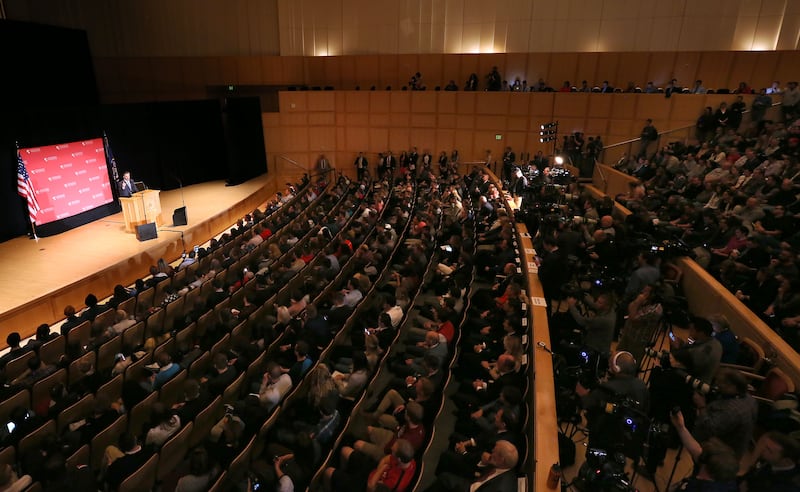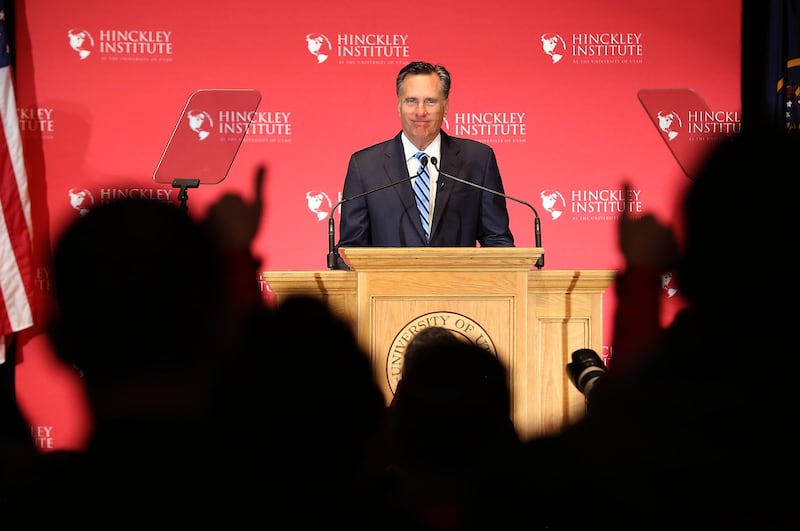SALT LAKE CITY — On March 3, 2016, Mitt Romney unleashed an unprecedented verbal attack on fellow Republican Donald Trump in a speech at the University of Utah. Romney didn’t hold back against the then-GOP presidential front-runner in his 17 minutes on stage before a standing room-only crowd at Libby Gardner Hall.
As New York Times political reporter Jonathan Martin wrote at the time: “Mitt Romney’s political assault on Donald J. Trump on Thursday was so savage that historians strained to recall any precedent in American politics, with a major party’s former nominee blistering his party’s leading presidential candidate in such a personal and sweeping fashion.”
Romney’s verbal onslaught didn’t come out of nowhere. He had grown increasingly frustrated with Trump but refrained from any public rebuke outside of a few interviews and written statements.
But Trump’s refusal to disavow the endorsement of David Duke, the former Ku Klux Klan leader, pushed Romney over the edge.
As the Boston Globe reported a week after the speech, Romney felt he could no longer remain silent about the damage he believed Trump had wrought on the Republican Party.
Something his son Josh mentioned while they were driving one afternoon stuck in his mind: What will you tell the grandkids?
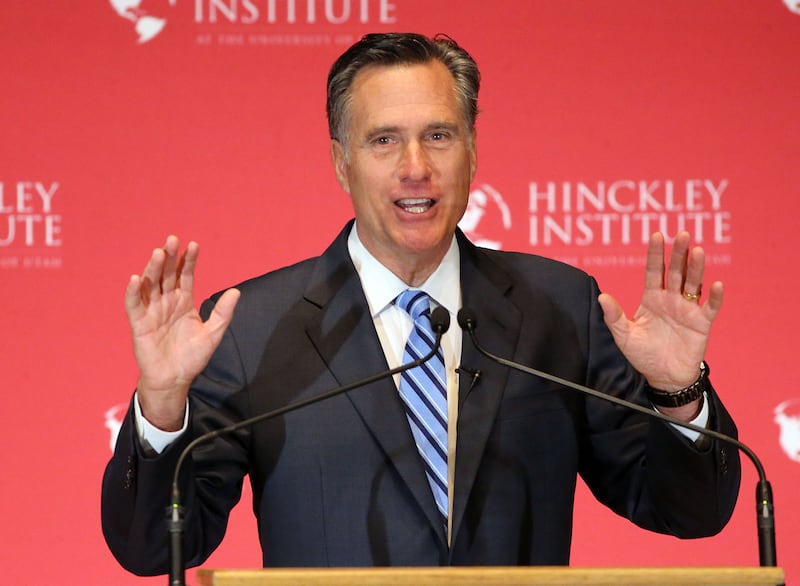
Romney decided on the spot in Utah that he would give a speech denouncing Trump, according to the Globe. Within hours, he poured months of frustration into a written draft of the speech he would deliver four days later.
Speculation about what the 2012 GOP presidential nominee might have on his mind ran high among national and local media. The University of Utah’s Hinckley Institute of Politics credentialed more than 100 reporters and at least nine cable TV news trucks lined up outside the hall.
Romney did not give the Hinckley Institute an advance copy of the speech, which turned out to be a scathing indictment of Trump as a “fraud’’ and “phony.’’
Those two words — fraud and phony — are the most remembered and most widely quoted of 2,145 words Romney uttered that day.
But he also made some dire predictions about a Trump presidency that have gone largely overlooked.
“And let me put it very plainly. If we Republicans choose Donald Trump as our nominee, the prospects for a safe and prosperous future are greatly diminished,” Romney said in the speech.
Now, as Trump nears the end of his first term, is there any substance to what Romney said about the then-future president?
What did Mitt Romney get right about Donald Trump? And what did he get wrong?
“It is a fascinating speech to return to, and I think in a whole host of ways it is remarkably prescient in the sense that it lays out a set of issues that we certainly do seem to be confronting four years later,” said Chris Karpowitz, co-director of the Center for the Study of Elections and Democracy at Brigham Young University.
Former Republican Utah Congressman Jason Chaffetz, though, said Romney badly missed the mark.
“Fortunately for the country and the Republican Party, Mitt Romney was wrong on almost all of his predictions,” said Chaffetz, an ardent Trump supporter who campaigned for Romney in the 2012 presidential election. “Romney was right on a few things. But by and large, he was wrong on 90% of it.”
Hinckley Institute Director Jason Perry doesn’t think Romney — right or wrong — would have a different take four years later.
“Even though I think Mitt Romney’s tone has changed, I don’t think he would change his speech much if he were giving it today,” he said.
Romney declined to be interviewed for this story.
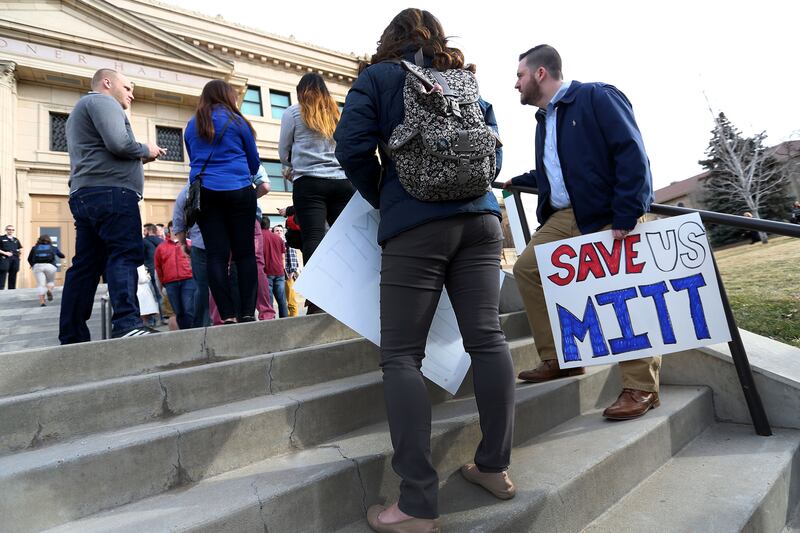
“Sen. Romney’s actions since the speech speak for themselves,” said Liz Johnson, Romney spokeswoman.
Since being elected to the Senate in 2018, he has continued to call out Trump on matters of character and leadership. He has also criticized some of the president’s policies, particularly on foreign affairs, while running legislation on issues he mentioned in the speech, including bills to preserve entitlements such as Social Security and drive down the national debt.
Romney was the only Republican in the Senate impeachment trial to vote to convict Trump of abuse of power.
Here’s a look at many of the elements of his speech and where things stand now.
Prolonged recession
“If Donald Trump’s plans were ever implemented, the country would sink into a prolonged recession. ... His tax plan in combination with his refusal to reform entitlements and to honestly address spending would balloon the deficit and the national debt.”
The COVID-19 pandemic has completely upended almost everything Romney predicted regarding the economy.
He is right about a recession, but wrong about the reason or reasons for it, said Natalie Gochnour, associate dean in the David Eccles School of Business at the University of Utah and chief economist for the Salt Lake Chamber.
Romney said in his speech that tariffs, trade wars, a tax plan without entitlement reform, and the deficit under Trump would sink the U.S. economy into a “prolonged recession.”
None of those factors are the cause of the current economic downturn, Gochnour said.
The best way to get an accurate picture of Trump’s economic record is to look at it before the pandemic, she said, describing it as “sound and successful.”
The U.S. was enjoying its longest sustained economic expansion in history at the time, with an unemployment rate in January of 3.5%. Gochnour, though, noted the Trump economy was part of the same economic expansion under President Barack Obama.
“When I look at President Trump’s economic record pre-COVID I give him high marks for tax and regulatory reform and low marks for fiscal responsibility, including lack of entitlement reform and deficit spending, and trade policy,” Gochnour said.
Significant trade tensions with both U.S. allies and countries such as China have arisen under Trump. Tariffs have disrupted international trade in a whole host of ways and ultimately that has been problematic for American farmers and American manufacturers and raised prices for American consumers, Karpowitz said.
That wasn’t enough to derail what was a humming economy before the pandemic. But there’s no question Trump’s approach has caused disruptions and problems in international trade.
The Trump administration would argue that it’s trying to get better trade outcomes. The United States-Mexico-Canada Agreement has been a concrete success.
“I do think you can find some progress but it’s accompanied by a lot of short-term anxiety and pain for segments of the economy like farmers when it comes to his trade policy,” Karpowitz said.
Most conservatives and Republicans did not like using tariffs, but it’s been effective, according to Chaffetz.
Prices, he said, did go up for a time in some sectors. “But the overarching trade objectives, I think, are still playing out and are moving in the right direction,” said Chaffetz, now a Fox News contributor.
Chaffetz acknowledged that Trump hasn’t done anything to reform entitlements, address spending or reduce the national debt. The Republican tax cut the president championed will add nearly $2 trillion to the deficit. There’s no rainy day fund. There was no effort to cut back during good times.
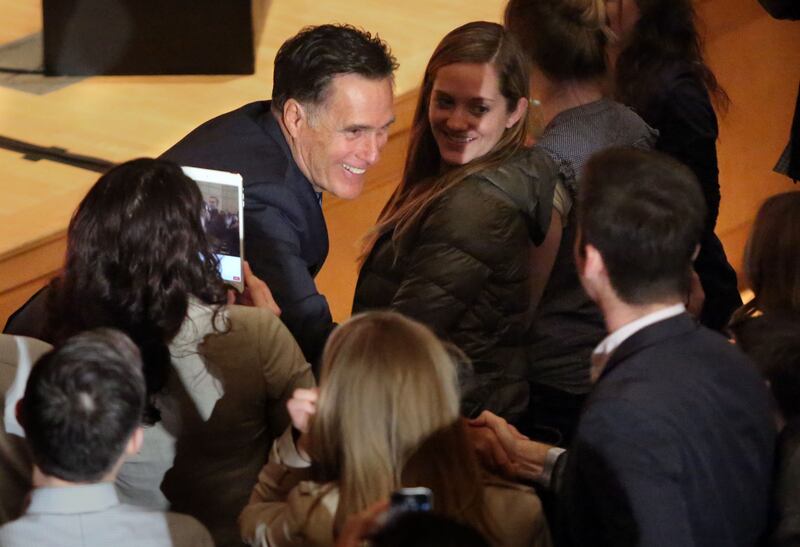
The tax cuts probably provided some additional energy to the economy but at the cost of significantly increasing the national debt.
Romney has expressed support for the president’s domestic agenda, including lower taxes, lower regulation and lower bureaucracy, though he called himself more conservative when it comes to the nation’s growing deficit.
Future less safe
“And let me put it very plainly. If we Republicans choose Donald Trump as our nominee, the prospects for a safe and prosperous future are greatly diminished. ... His foreign policies would make America and the world less safe.”
From the beginning, Trump has been harsher with NATO allies than he has been with Russia or China, at least in terms of his personal discussions, though that’s not to suggest that the administration hasn’t done anything on foreign policy issues, Karpowitz said.
But his benign treatment of authoritarian leaders such as Russian President Vladimir Putin, Chinese leader Xi Jinping and North Korea’s Kim Jong Un, who got a coveted face-to-face meeting with Trump, has produced no obvious positive results or benefits for the United States, he said.
“There have been symbolic moments that could have been moments of progress, but in retrospect they haven’t been followed up with the kind of work and substantive agreements that would be necessary to capitalize on those symbolic moments,” Karpowitz said.
Things could be worse, according to Thomas Wright, the director of the Center on the United States and Europe and a senior fellow in the Project on International Order and Strategy at the Brookings Institution.
“Trump has not (yet) blundered into a major security crisis or pulled out of NATO. Russia has not (yet) invaded the rest of Ukraine or other states. Xi is assertive internationally but not (yet) reckless,” he wrote recently, including the parenthetical statements.
“Romney was prescient about Trump, just as he was about Vladimir Putin. He identified the unique risks of a Trump presidency early on and everything he predicted has come to pass, The United States is being pummeled by a pandemic, America’s alliances are hanging by a thread, and U.S. leadership has evaporated,” Wright said.
National security adviser Robert O’Brien said Romney was right about a lot of things, including Russia, but he was “certainly wrong about President Trump’s foreign policy.”
O’Brien, who worked on Romney’s 2008 and 2012 presidential campaigns, said Trump has stood up to China and is rallying U.S. allies to do the same. The president also destroyed the physical caliphate of ISIS, he said.

Getting tough with NATO resulted in nine allies paying $400 billion more for defense through 2024, he said, adding it’s a “massive” accomplishment that has been underreported.
“There are people who don’t want to recognize the accomplishments because they fear that it would give credit to President Trump, and that’s a shame,” O’Brien said.
Pulling American troops from Germany was a huge decision in that the U.S. is walking away from the role it has played in maintaining, supporting and being the core part of the post World War II peace, Karpowitz said.
Romney called it a slap in the face to Germany at a time when the U.S. and its allies should be drawing closer in their mutual commitment to deter Russian and Chinese aggression. He has taken aim at Trump for “fawning” over Xi and getting “cozy” with dictators.
Trump has also pulled troops from Syria and pushed U.S. allies around the world to pay more for the commitment of American forces to defend them. He has continued to try to make good on his vow to end U.S. involvement in “endless” foreign wars, though he vetoed legislation to do that in the Saudi-led civil war in Yemen.
“There seems to be an extreme amount of uncertainty in the world right now. You add the normal tensions that exist, those that have developed over the past four years and you put the wrapper of COVID-19 around it, and things feel very unsafe and tenuous,” Perry said.
Perhaps the biggest foreign policy win for the Trump administration is the United Arab Emirates and Bahrain formally establishing diplomatic relations with Israel. Trump hailed the agreements as an “important day for peace.”
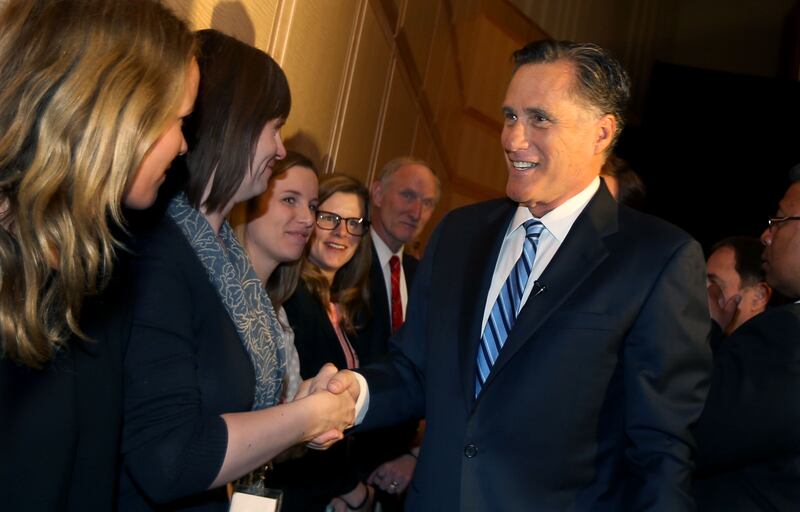
Trump withdrew the U.S. from the Iran nuclear deal, pulled out of the Paris climate accord, moved the U.S. embassy in Israel to Jerusalem, and “yet was still able to forge a historic peace agreement with Bahrain and the United Arab Emirates,” Chaffetz said.
“I think the prospects of a volatile Middle East are much safer with Donald Trump than they ever were,” he said.
A phony, a fraud
“Here’s what I know. Donald Trump is a phony, a fraud. His promises are as worthless as a degree from Trump University. He’s playing the members of the American public for suckers: He gets a free ride to the White House and all we get is a lousy hat.”
Romney questioned Trump’s ability to rally the nation to a common cause. He invoked John F. Kennedy and Abraham Lincoln.
Kennedy asked people to consider what they could do for their country. Lincoln drew upon the better angels of human nature to save the union, Romney said. He talked about presidents who put the interests of the country ahead of their own.
Romney didn’t see a pandemic or racial unrest in the wake of a Black man dying under a white police officer’s knee, but recognized there would be crises to challenge the nation and the president, and believed that Trump wouldn’t be up to the task.
Karpowitz said Trump has not been able to bring the country together in any substantial way. He focuses more on deflecting responsibility and blaming others for things that go wrong.
“And that’s exactly what Mitt Romney predicted he would do,” Karpowitz said. “I think that’s part of what he meant when he talked about Donald Trump being a phony or a fraud. He’s not able to really do the substantive things that we expect presidents to do.”
Chaffetz said there’s no question Trump has delivered on his promises.
“No doubt Sen. Romney doesn’t like or appreciate President Trump’s style, but the president does get things done. Unconventional? Yes. Different? Yes. Unlike anything we’ve ever seen before? Yes. But it seems to work,” he said.
“It’s crass, it’s unconventional but America loves it,” Chaffetz said. “Granted there are a lot of people that don’t. I get that.”
Noteworthy were the comments of Gen. James Mattis, who resigned as the president’s secretary of defense in December 2018, and excoriated the president in a book released earlier this year: “Donald Trump is the first president in my lifetime who does not try to unite the American people — does not even pretend to try. Instead, he tries to divide us,” Mattis said.
Clinton victory
“A person so untrustworthy and dishonest as Hillary Clinton must not become president. Of course, a Trump nomination enables her victory.”
Trump proved Romney and all the polls and prognosticators wrong with his improbable win in the 2016 election. Though Clinton won the popular vote by more than 3 million votes (the fifth time a victorious candidate for president has lost the popular vote), Trump won all the big swing states and the Electoral College votes that go with them to claim a 304 to 227 victory.
Romney’s speech in March was intended to swing support for one of the remaining Republican primary candidates and came only days after Super Tuesday, when Trump won seven states, Ted Cruz won three states and Marco Rubio won one state. Clinton also solidified her lead over Bernie Sanders that week, winning seven states with Sanders winning four.
Tax returns
“We will only really know if he’s a real deal or a phony if he releases his tax returns. ... I predict that there are more bombshells in his tax returns. ... And I predict that despite his promise to do so, first made over a year ago, that he will never ever release his tax returns. Never — not the returns under audit; not even the returns that are no longer being audited. He has too much to hide.”
A New York Times investigation of Trump’s finances revealed some bombshells.
Trump paid no taxes in 11 of the 18 years between 2000 and 2017. In both 2016 and 2017, he paid only $750, the Times reported, citing more than two decades of tax-return data it said it obtained.
He was able to do so both because many of his businesses report losing large amounts of money — which reduces his taxable income — and because he has engaged in questionable tax practices, the report found.
Trump called the story “fake news.”
In a series of tweets, Trump said, “Much of this information is already on file, but I have long said that I may release ... Financial Statements, from the time I announced I was going to run for President, showing all properties, assets and debts. It is a very IMPRESSIVE Statement, and also shows that I am the only President on record to give up my yearly $400,000 plus Presidential Salary!”
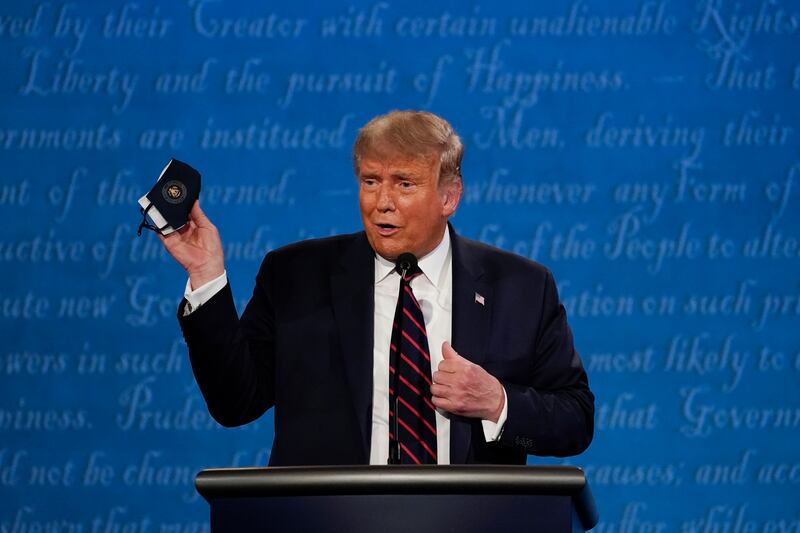
The president has guarded his tax returns to the U.S. Supreme Court and back. And further court wrangling likely means he’ll make it to the Nov. 3 election without releasing them.
In a September 2016 presidential debate, Trump said he would release his returns as soon as a routine audit is finished. Four years later, the IRS is still working on it, the White House said in July.
In a debate with Democratic challenger Joe Biden, Trump again said he would release his returns but gave no timeline.
Every sitting president’s returns are audited as a matter of routine. The IRS has long said that nothing prevents an individual from making tax returns public while an audit is underway. Every president since Jimmy Carter has voluntarily released his returns.
Before he resigned from the House, Chaffetz and the late Democratic Rep. Elijah Cummings, of Maryland, were working on legislation to require presidential and vice presidential candidates to release their tax returns.
“If you really wanted it done, Sen. Romney, introduce a bill,” Chaffetz said.
Dishonesty
“Dishonesty is Donald Trump’s hallmark.”
Trump has made thousands of false or misleading statements during his nearly four years as president. The Washington Post Fact Checker column has tallied more than 20,000 untrue or misleading claims in its database as of July.
But RealClear Politics contends that a cursory look at the Post database shows that the idea that Trump has told 20,000 “false or misleading” statements is itself false and misleading. Many of the total are redundancies that Trump has repeated over and over again.
More problematic is that thousands of statements the Post labels as untrue or misleading are more properly considered the habitual verbal excess for a man known for his immoderate form of communication, according to RealClear Politics.
After reading special counsel Robert Mueller’s report on the investigation into Russian interference in the 2016 election last year, Romney delivered a scathing rebuke of Trump.
“I am sickened at the extent and pervasiveness of dishonesty and misdirection by individuals in the highest office of the land, including the president,” he said.
Judgment
“He has neither the temperament nor the judgment to be president and his personal qualities would mean that America would cease to be a shining city on a hill.”
Romney didn’t anticipate a pandemic or the economic and health devastation that COVID-19 would inflict on the country. But he did raise red flags about Trump’s ability to run the federal government effectively.
“Those are the kinds of problems, even though the speech didn’t talk about anything like a pandemic, those are the kinds of concerns that Romney was raising,” Karpowitz said.
Trump downplayed the virus and was slow to mount a national response.
Romney recently noted that the U.S. has “5% of the world’s population but 25% of the world’s deaths due to COVID-19. And there’s no way to spin that in a positive light.”
His temperament and judgment has also been called into question for tweeting and retweeting dubious claims and conspiracy theories, and for failing to call out white supremacy when given the chance during debates and speeches (after repeated questioning by Savannah Guthrie in a town hall-style interview earlier this month he did say, “I denounced white supremacy, OK?”).
Chaffetz, who played golf with Trump a month ago, said the president is much different one-on-one than he is at a rally. He described Trump as “wicked smart” and “incredibly thoughtful” and someone who has a clear grasp of what’s happening “like nobody I’ve ever seen before.”
A lot of people criticize Trump for the way he says things, but he should be winning awards for his openness and transparency, Chaffetz said. He gives people insight into exactly what he’s thinking, he said, adding that’s better than the overly polished, perfectly written, staff-driven press releases of past administrations.
“Style and temperament matter to Mitt Romney,” Chaffetz said, “and to that end Donald Trump will never be Mitt Romney.”
